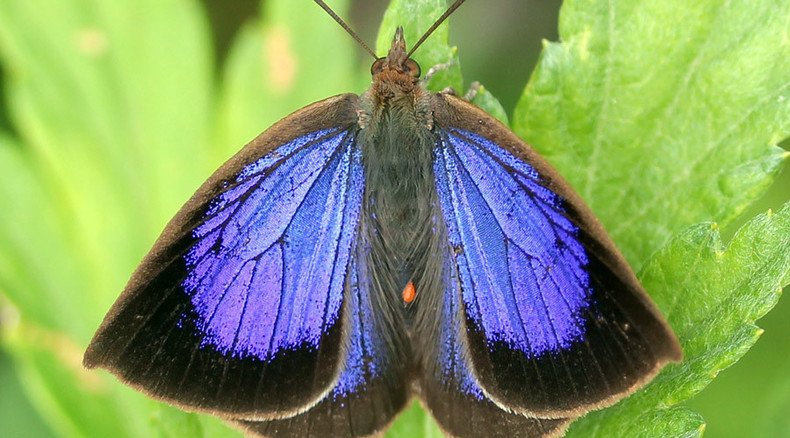Zombie bodyguards: How caterpillars enslave ants with sugar addiction (VIDEO)

A caterpillar’s sugar-like secretions make addicted slaves of the ants who taste it. This new discovery by Japanese scientists overturns the traditional idea of a mutual “fair exchange” between the insects.
Scientists previously believed that the life of a Japanese oakblue butterfly caterpillar resembled that of a queen bee or ant, due to its loyal ant servants. But a new paper, published in the journal Current Biology shows the Japanese species in a more ominous light.
A three-member team at Japan's Kobe University noticed that the ants who served a Japanese oakblue butterfly caterpillar did so on a constant basis, escaping their daily abilities and even their search for food. Previously scientists assumed that they stayed with the caterpillar in some sort of symbiotic relationship on their own volition, for the sake of benefiting from a sugary syrup-like secretion from the caterpillar.
However, a really free exchange would see lines of ants being pleased to serve the caterpillar for a couple of hours, getting its sugar, and moving on. However, the Japanese research showed that it was the same ants which constantly stood guard over the caterpillar.
Scientists discovered that the caterpillar controls its “bodyguards” with the help of both chemical and visual signals. The ants who sip its sugary secretions start taking cues from the movement of the caterpillar’s ‘tentacles’ and abide by its instructions.
Because the caterpillar has to secure its safe transformation into a butterfly, it wraps itself in a cocoon. During this period it needs protection from predators such as wasps and spiders. The strength of its pheromones leaves the vulnerable creature with an aggressive brigade of loyal bodyguards.
READ MORE: Bug burger anyone? Insect-based grub could hit Swiss groceries next year
"There are glandular cells near the tentacles that could be secreting chemical signals," researcher Masaru Hojo told New Scientist. "It is possible that both visual and chemical signals are stimulating the ant aggression."
The team found that the hooked ants had lower levels of dopamine, a chemical that is responsible for movement and aggression in insects, than the ones which did not try out the sugary treat. After receiving a drug called reserpine which blocks the transport of dopamine the ants became less dependent on the caterpillar.
"We conclude that DNO secretions of lycaenid caterpillars can manipulate attendant ant behavior by altering dopaminergic regulation and increasing partner fidelity," Hojo and his colleagues wrote in their paper.
The secret ingredient in the caterpillar’s secretions has not yet been identified.
READ MORE: 'Bees with Alzheimer’s?' Aluminium pollution linked to dementia in bees
The findings, which inspired the Kobe researchers to study other fauna relationships considered to be symbiotic, could not be as destructive to the ants as it seems.
"The benefit for the caterpillar is obvious, but we do not know whether the benefit for the ants is as minimal as the authors argue," Martin Heil, a scientist at the Center for Research and Advanced Studies of the National Polytechnic Institute in Irapuato, Mexico told New Scientist. "If the liquid that the caterpillars secrete is sufficiently nutritious, then it might well be that the overall balance for the ants also is positive."













